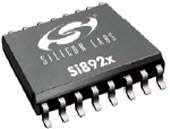Silicon Labs' Si8920 isolation amplifier. The Si8920 analog amplifier has strong galvanic isolation and has the highest bandwidth and lowest signal delay in the industry. The amplifier's low-voltage (± 100mV or ± 200mV) differential input is ideal for measuring voltage across a shunt resistor or where the sensor must be isolated from the control system, such as industrial motor drives. AEC-Q100 qualified amplifiers are ideal for use in harsh environments such as solar inverters, high voltage power converters, uninterruptible power supplies (UPS) and electric / hybrid electric vehicle (EV / HEV) systems.
Si8920 uses proprietary CMOS-based isolation technology. Compared with competitive isolation technology, this technology can withstand 5kV withstand voltage and 1200V working voltage, and provides a wider operating temperature range, better noise immunity and more Long service life. The amplifier has an extremely low 0.75µs signal delay, enabling the control system to respond quickly to fault conditions or load changes. The amplifier's low 1 µV / C offset drift ensures stable performance over the entire operating temperature range of 40C to + 125C. The high common-mode transient immunity of the Si8920 amplifier maintains accurate measurements even in the presence of high-power switches. The amplifier's industry-leading signal bandwidth (up to 750kHz) ensures fast, accurate DC current measurement and accurate representation of primary signals and harmonics.
Mouser also offers Silicon Labs' Si8920ISO-KIT evaluation kit, which helps designers test Si8920 amplifiers against user-connected shunt resistors. The kit has test points for monitoring device input, output, and power, and includes surface mount component pads for input or output filtering circuits.
